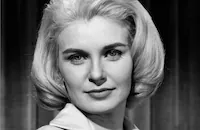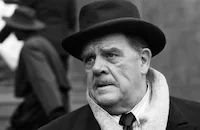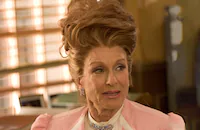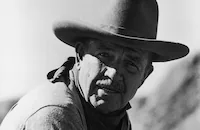WUSA
Brief Synopsis
Cast & Crew
Stuart Rosenberg
Paul Newman
Joanne Woodward
Anthony Perkins
Laurence Harvey
Pat Hingle
Film Details
Technical Specs

Synopsis
Rheinhardt, a drunken drifter, collects a debt from his old friend Farley, a con man currently posing as a revivalist preacher in New Orleans, and learns from him that right-wing radio station WUSA is looking for an announcer. Later that night in a waterfront bar he meets Geraldine, who is trying to hustle a drunken sailor into buying her dinner; after Rheinhardt buys her a steak, she takes him to her roominghouse where they spend the night together. The next day he meets Bingamon, the radio station's owner, and is hired on the stipulation that he read reactionary editorials on the air. Soon he meets the naive and liberal Rainey, who has been unknowingly duped by Bingamon into taking part in a phony welfare investigation actually intended to create a backlash among whites. Rheinhardt, disturbed because he, too, is being manipulated, gets drunk, quarrels with Rainey, and then walks out on Geraldine. Later, after Rainey has learned the truth of the situation from black newspaperman Roosevelt Berry, WUSA sponsors a large political hate rally with gospel singers, a guest appearance by an aging cowboy star, and a demonstration by black militants outside the stadium. Rainey, now completely disillusioned, tries to assassinate Bingamon in front of the audience, but he hits one of the demagogue's assistants. As Rainey tries to escape, the hysterical crowd stomps him to death. Meanwhile, the gospel group, which is made up of Geraldine's hippie neighbors, fears that the riot will lead to drug arrests, and they give Geraldine their stash of marijuana. When the police discover the drugs and arrest her, Geraldine hangs herself in the jail cell. Rheinhardt learns the news from Geraldine's crippled friend, Philomene; after visiting the grave, he packs his bags and leaves the city.

Director

Stuart Rosenberg
Cast

Paul Newman

Joanne Woodward

Anthony Perkins

Laurence Harvey

Pat Hingle

Cloris Leachman

Don Gordon

Michael Anderson Jr.
Leigh French

Moses Gunn

Bruce Cabot
B. J. Mason
Robert Quarry
Wayne Rogers
Hal Baylor
Jim Boles

Diane Ladd
Sahdji
Skip Young
Geoff Edwards
Clifton James
Tol Avery
Paul Hampton
Jerry Catron
Geraldine West
Lucille Benson
Susan Batson
Zara Cully
The Preservation Hall Jazz Band Of New Orleans
Crew
James Arnett
Bob Banks
Anthony Bavero
Hoyt Bowers
Norma Brown
William Clark
Betty Crosby
Neil Diamond
John Foreman
John Foreman
Les Gorall
Sydney Guilaroff
Bill Hanks
Clancy Herne
Dean Hodges
Lloyd Isbell
Philip Jefferies
Austen Jewell
Jerry Jost
William Kiernan
Howard W. Koch Jr.
Al Mack
Hank Moonjean
Hank Moonjean
Richard Moore
Arthur S. Newman Jr.
Paul Newman
Paul Newman
Jim Orendorff
Richard Portman
Lynn Reynolds
Lorraine Roberson
Stuart Rosenberg
Lalo Schifrin
Roger Sherman
Robert Stone
Nat Tolmach
Travilla
Jack Wilson
Robert Wyman

Film Details
Technical Specs

Articles
WUSA - Paul Newman & Joanne Woodward in W.U.S.A. on DVD
Three rootless individuals are adrift in New Orleans. The good-hearted Geraldine (Woodward) is a sometime prostitute; she carries a bad facial scar from an unfortunate encounter. The crippled Philomene (Cloris Leachman) likes Geraldine and loans her space in her apartment. Disturbed ex- Peace Corps volunteer Rainey (Anthony Perkins) takes a job making a survey of welfare recipients. He enjoys shooting photos in the poorer parts of town but senses that something is not right about his job. The local "boss" Clotho (Moses Gunn) seems to know more about the survey than Rainey does. He lets the awkward Rainey go about his business, even though the information he gathers about the welfare cases makes little sense.
Journeyman radio announcer Rheinhardt (Paul Newman) arrives in town and heads straight for the bars. When a local pimp threatens Geraldine for working independently, Rheinhardt picks her up and they take an apartment in Rainey's building. Rheinhardt finds an announcer job at WUSA, a station that claims to speak "with a point of view" for what it calls Real Americans. Despite his ever-present thermos of booze, he performs professionally, giving the station's slanted news copy the desired conservative spin. Station owner Bingamton (Pat Hingle) envisions Reinhardt as the voice of his political movement, a reactionary take-back of the country. Bingamton keeps alluding to a new wave that will come sooner than anyone expects.
Rainey challenges Rheinhardt on the twisted politics of his employers, but the alcoholic DJ refuses to engage in a debate. Geraldine sympathizes with the fragile Rainey, who has discovered that Binghamton has commissioned the bogus survey to inflame the public about welfare cheaters. The WUSA scheme is to cut off state benefits and "starve" the poorer, and mostly black, population out of New Orleans. The radio station sponsors a rally in a large stadium to promote its conservative candidates. Geraldine attends, and Rheinhardt takes his place on the dais with Bingamton and his political cronies. While a brass band plays and costumed gunmen act out a symbolic shootout on the stadium floor, Rainey climbs into the high rafters ... with a gun.
WUSA tries to be a political thriller but never delivers on the promise. The script focuses on a group of unhappy outsiders that on fringe of a barely-glimpsed conspiracy. The screen time spent in examining the believable characters played by stars Newman and Joanne Woodward seems unrelated to the story's center of interest. Geraldine describes herself as "too dumb for the phone company and too old for the five and dime." Rheinhardt simply ignores the deal-making he sees back at the station; when Rainey challenges him to show a conscience, his response is to turn hostile. As much as this mess of disenchantment and apathy reflects reality, it only frustrates the audience; we keep expecting Newman's Rheinhardt to find his moral footing and stop being so passive.
Newman and his director Stuart Rosenberg (Cool Hand Luke) retain most of the book's characters, using too many good actors in roles that contribute little to the story. Clifton James (a sailor), Tol Avery and Skip Jones (politicians), Bruce Cabot and Robert Quarry (glimpsed only briefly) and Michael Anderson Jr. (a hippie musician) are admittedly colorful, but little else. As a crooked preacher, Laurence Harvey adds sparkle to a couple of scenes and Wayne Rogers has a fine scene arguing with the irate Anthony Perkins in a Playboy Club. But too many of the characters are given too little to do, like Cloris Leachman's interesting Philomene. The narrative disconnect in this movie is severe.
The WUSA conspiracy that probably seemed far-fetched in 1970, but today plays like business as usual: a political coalition uses the power of radio to spread a dishonest and deceitful message. The underworld boss Clotho has apparently been paid off to cooperate with the fake welfare survey. Pat Hingle's Bingamton, a powerful man with several elected officials at his beck and call, is quite a prophetic character. After the experience of Hurricane Katrina his attitude toward the poor blacks of New Orleans seems entirely credible. Although Bingamton's minions behave like conspirators, they're not doing much more than energizing their power base within the community. Except for a couple of smug slogans and its use of the American flag in its logo, we hear none of WUSA's on-air propaganda. We hear nothing inflammatory; Rheinhardt is never shown delivering a political speech on the air.
There is no visible liberal opposition to WUSA. Newman's Rheinhardt is a cynical sell-out who doesn't care what WUSA is up to, so long as he gets his salary. The preacher is a fraud and Rheinhardt's pot-smoking neighbor Bogdonovich (Don Gordon) is apathetic and uninvolved. Geraldine despairs at Rheinhardt's lack of concern, but can do nothing. The overly emotional Rainey does find welfare cheats among the cases he interviews, which actually supports Bingamton's position. Rainey's nut job comes off as something a reactionary propagandist would invent to criticize Kennedy liberalism: he's a Peace Corps volunteer and a crazed assassin?
Director Stuart Rosenberg gives his actors space to perform but fails to bring WUSA to anything resembling a satisfying conclusion. The right-wing hate rally at the stadium is an inept re-run of the finish of John Frankenheimer's The Manchurian Candidate. Rheinhardt's hippie neighbors are allowed to entertain at the rally, an unexplained choice that makes little sense. Rheinhardt is about to speak when gunshots ring out, at which point both the movie falls apart in confusion. Laurence Harvey's preacher advises Rheinhardt that the WUSA gang is finished and that they'd all best leave town. It makes more sense that the publicity from the attempted assassination would actually strengthen Bingamton's hand. Although the mounted police use the chaos to attack the protesting poor, the hapless Geraldine is inadvertently victimized because somebody asks her to carry his marijuana stash. The penalty for possession in Louisiana is ten to fifteen years in prison.
Critics of the time acknowledged WUSA's parallels to earlier political films like Frank Capra's Meet John Doe but blamed its failure on an aimless script and Rosenberg's limp direction. Many felt that Anthony Perkins had found his best role since Psycho, but Rainey comes off as an accumulation of tics and mannerisms. His character is too easily set up as a misguided martyr, beaten to death by Bingamton's mob of hateful whites. The film's passive-apocalyptic tone has more in common with Nathanael West's novella The Day of the Locust.
A committed anti-war protester, Paul Newman ranked high on President Nixon's "unfriendly" list. He and Joanne Woodward did their best to promote WUSA and are on record as complaining about Paramount's unenthusiastic support for the film. In at least one interview Newman hinted at political interference. But ten years later, his final verdict was that WUSA was "a film of incredible potential which the producer, the director and I loused up. We tried to make it political, and it wasn't." 1
Olive Films' DVD of WUSA is a good transfer of a feature that has never been released on any home video format. The enhanced 2:35 image is clean and bright; some of the audio can be difficult to understand when the actors slur their words -- Paul Newman has a habit of muttering his dialogue at his shoes. The plain-wrap cover art makes the disc look as if it were homemade.
The disc offers no subtitles and no extras. This is a shame, as author-screenwriter Robert Stone, a counterculture figure who also wrote the influential book Dog Soldiers, shows an uncommonly keen appreciation of political trends. Several critics hinted that Stone's Bingamton character was based on oil tycoon H.L. Hunt, who in the 1950s backed a syndicated conservative political TV show called Facts Forum. Hunt is also frequently named in unsubstantiated conspiracy theories surrounding the assassination of John F. Kennedy.
1. TIME magazine, December 6, 1982.
For more information about W.U.S.A., visit Olive Films. To order W.U.S.A., go to TCM Shopping.
by Glenn Erickson

WUSA - Paul Newman & Joanne Woodward in W.U.S.A. on DVD
Quotes
I'm a survivor. Ain't that great?- Rheinhardt
Trivia
Notes
Location scenes filmed in the French Quarter and other parts of New Orleans. Working Title: A Hall of Mirrors.

Miscellaneous Notes
Released in United States Winter January 1, 1970
Released in United States Winter January 1, 1970













